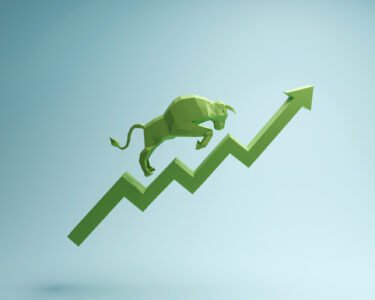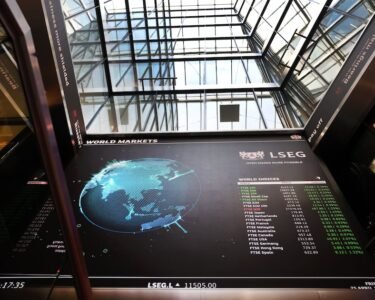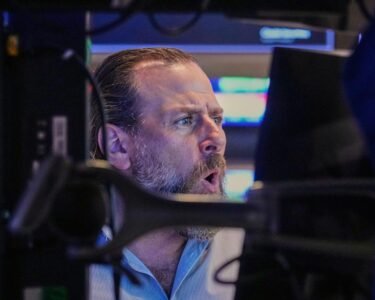Stocks rallied sharply on Wall Street yesterday with the S&P 500 closing up 2 per cent. Tech led the way higher as the most oversold names from tariffs bounced on the news flow. Vix is down again to 26, showing cautious optimism among investors. European markets are broadly higher this morning, but much more modest gains in the first hour of trading.
The FTSE 100 pushed up a quarter of a per cent on Friday, as it looks to extend its gains for the week, as positive vibes on trade – the current flavour du jour – is helping broader risk sentiment. But the blue chips are struggling to make much headway above 8,400, which seems to be a tough nut to crack, having acted as a very strong horizontal resistance level touched several times in the second half of last year. It’s all looking a little lacklustre and lacking any positive momentum without a fresh catalyst until we make a meaningful breach of 8,400 and look at 8,500, otherwise, a retest of 8,250 could be on.
The FTSE 100 closed marginally higher (0.05 per cent) yesterday, extending gains for the ninth consecutive day, supported by positive sentiment spilling over from the US. Weir Group (4.5 per cent) and St James’s Place (2.2 per cent) performed strongly following upbeat updates. However, financials lagged, with NatWest (down 1.6 per cent) and Barclays (1.4 per cent) weighing on sentiment amid caution around trade uncertainties and upcoming earnings. Unilever dipped slightly on cautious forward guidance.
Trade wars
One, two, three, four, I declare a trade war…the thumb wrestling continues, but we are far from a real fight, are we not? It’s all just words and threats and attempts to back down without losing face.
US president Donald Trump says he’s talking to China, but who’s listening? China is, though, encouraging firms to identify products for exemption from the 125 per cent tariffs, suggesting a shift towards easing the trade war. Gold dropped below $3,300, undoing earlier gains, as China contemplates lifting tariffs on certain US imports. Still headline driven, but we seem to see both parties appearing more pragmatic.
Fed governor Christopher Waller laid out the case for the central bank to start cutting soon. He said he’d support rate cuts should tariffs lead to job losses and was willing to “look through whatever price increases there are”…so that is the Covid playbook – let the inflation run, hope it’s a one-off pass through from tariffs and focus on the employment bit of the dual mandate. Chair Jerome Powell has so far been more balanced in his view, but you are getting closer to the point where we may pivot, and the market is sensing this.
So how is the data looking? US weekly unemployment claims were solid and showed no recession signal. Core durable goods orders pumped in March ahead of tariffs – evidence of massive stockpiling – with orders up 9.2 per cent from a 0.9 per cent rise in February. Note, that in the 3 weeks since the tariffs took effect, ocean container bookings from China to the United States are down more than 60 per cent. The impact is yet to come. Uncertainty plus higher rates saw US home sales last month dropped to their slowest March pace since 2009. Anyway, Waller reckons it will take two months for the effects of tariffs et al to show up in the data, so no rush, but he’s signalling the Fed is ready to go pre-emptive to an extent.
Earnings updates
WPP reported first quarter like-for-like revenue down 2.7 per cent, a larger decline than expected. While WPP is not directly affected by tariffs per se, its advertising revenues depend on confidence among its customers – large multinational corporations – who are affected by tariffs. So far, it’s not seeing any significant change in client behaviour, and is reiterating guidance for the full year, but the real impact of tariffs is yet to be felt. One uncertainty is crowding out investment, while the 90-day delay only kicks the can down the road – progress on trade talks looks sluggish so far.
Alphabet earnings – this was a handsome beat, and shares rallied after hours with EPS well ahead of the forecast. Revenues up 12 per cent and net income 46 per cent is hard to argue with. Alphabet is facing an existential threat in terms of AI taking market share in ads and search, but thus far, there is no sign of wobbles. Intel also beat but warned of tariff impact and issued weak guidance. The new CEO is five weeks in and needs to cut costs and focus on innovation. Shares fell 6 per cent after hours.
By Neil Wilson, investor strategist at Saxo UK




